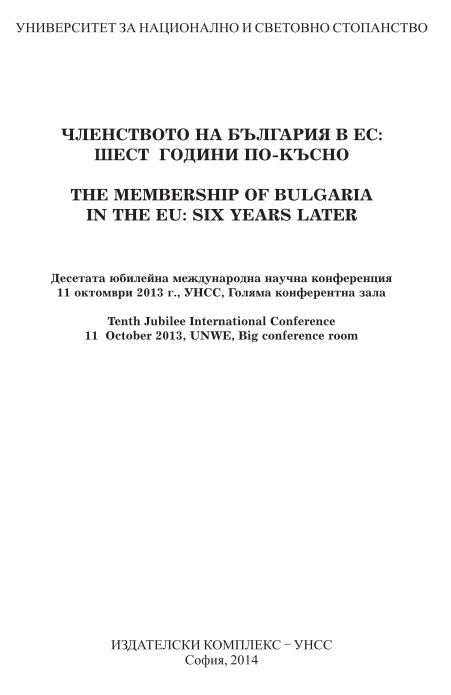Дългият “Турски марш” - пътят на Турция към ЕС, ползи и препятствия
Long "Turkish March" - Turkey's accession to the European Union, benefits and barriers
Author(s): Vladimir V. Ajzenhamer
Subject(s): Politics / Political Sciences, Politics, EU-Approach / EU-Accession / EU-Development, Geopolitics
Published by: Университет за национално и световно стопанство (УНСС)
Keywords: Turkey; EU; Accession Negotiations; Benefits; Obstacles; Economy; Army; Alternatives
Summary/Abstract: The aim of this paper is to present the political, social and, to some extent, economic circumstances of the ongoing process of European integration of Turkey. The author will try to highlight the key obstacles to Turkish membership in the EU, and to clearly point out the specific benefits that this country has made on the road to EU accession. In this paper we will first exhibit historical circumstances which "traced" Turkey in EU direction, and then proceeded with a brief chronology of the accession process. After that we will analyze the main causes of the Turkish "stumbling" on the European path. Weak political pluralism, compromised human and minority rights, the Cyprus issue and disputes with Greece, are problems which Turkey has to positively resolve in order to achieve progress in the accession negotiations. Also, major problem is the negative perception of Turkish EU membership among many political leaders and EU citizens. After that, we will deal with particular benefits that Turkey has achieved thanks to the implementation of the Association Agreement. From the economic point of view Turkey undoubtedly benefited from its "harmonization" with EU. EU market remains the largest export market for Turkish goods, and part of the explanation of its current economic boom should be sought in the actual economic arrangements with the EU that eased Turkey access to the markets of most developed European countries. More than a third of Turkey's total exports goes to EU countries and about 80% of all foreign direct investment to Turkey comes from the EU. However, the main "benefit" that the EU process has brought to Turkey was not economic. In fact, it was the process of accession to the EU that provide civil authorities with arguments to put powerful Turkish army under civil control. The specific steps were taken in 2003, and were related to the reform of the National Security Council. In that year Turkish Majlis approved so-called "seventh reform package" for harmonization with the EU, which significantly weakened the military capacity of interference in the affairs of civil government. Thereby, the National Security Council was stripped of executive power and it's role of "watchdog" was abolished. Also, this security body lost previous possibility of unlimited access to civilian institutions. After that, the EU has repeatedly made it clear that they will not allow any toying with the concept of democracy, and openly distanced itself from the traditional Turkish formula of Army as the "guardian" of democracy. In the final part we will analyze the current Turkish foreign policy, attempting to answer the question whether on Bosporus currently some new, not so much "Western" winds are blowing? In recent years, Turkey extremely sharpened its rhetoric toward the EU. The culmination of this trend was the actualization of the Cyprus issue and Turkey's threats to completely freeze relations with the EU during the Cyprus EU Presidency in the second half of the 2012th. Also public support to EU integration project is facing a drastic decline. In line to the public mood, Turkish political elite increasingly talk about alternative integration – BRICS and Shanghai Cooperation Organization.
Book: Членството на България в Европейския съюз: шест години по-късно
- Page Range: 215-225
- Page Count: 11
- Publication Year: 2014
- Language: English
- Content File-PDF

